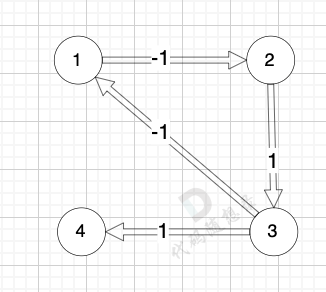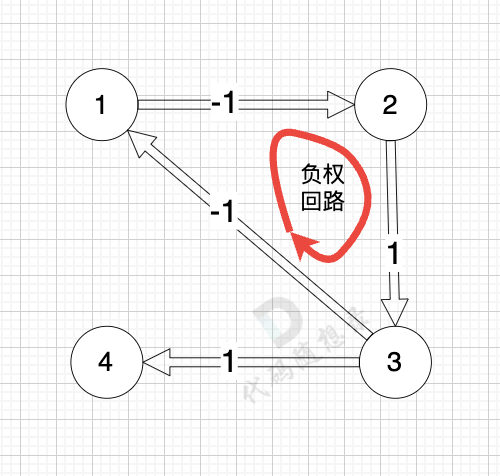Bellman-Ford之判断负权回路
题目描述
某国为促进城市间经济交流,决定对货物运输提供补贴。共有 n 个编号为 1 到 n 的城市,通过道路网络连接,网络中的道路仅允许从某个城市单向通行到另一个城市,不能反向通行。
网络中的道路都有各自的运输成本和政府补贴,道路的权值计算方式为:运输成本 - 政府补贴。权值为正表示扣除了政府补贴后运输货物仍需支付的费用;权值为负则表示政府的补贴超过了支出的运输成本,实际表现为运输过程中还能赚取一定的收益。
然而,在评估从城市 1 到城市 n 的所有可能路径中综合政府补贴后的最低运输成本时,存在一种情况:**图中可能出现负权回路。**负权回路是指一系列道路的总权值为负,这样的回路使得通过反复经过回路中的道路,理论上可以无限地减少总成本或无限地增加总收益。为了避免货物运输商采用负权回路这种情况无限的赚取政府补贴,算法还需检测这种特殊情况。
请找出从城市 1 到城市 n 的所有可能路径中,综合政府补贴后的最低运输成本。同时能够检测并适当处理负权回路的存在。
城市 1 到城市 n 之间可能会出现没有路径的情况
题目链接:https://kamacoder.com/problempage.php?pid=1153
文章链接:https://programmercarl.com/kamacoder/0095.城市间货物运输II.html
思考
本题是bellman-Ford 的存在负权回路的场景。
以示例说明

问图中 节点1 到 节点4 的最短路径是多少(题目中的最低运输成本) (注意边可以为负数的)?
我们正常情况可以是节点1 -> 节点2 -> 节点3 -> 节点4,这样的路径总成本为 -1 + 1 + 1 = 1。
如果出现了负权回路:

这就意味着我在到达终点前可以一致绕圈减少成本。出现了无穷小的成本,本体就无解了。
在正常结构中,我们知道至多松弛 n-1 条边就可以得到起点到任何节点的最短路径。松弛 n 以上 minDist 数组不会有变化。
然而负权回路中,无限次松弛,会得到无限小成本。即使按照正常算法我们进行n-1轮并停止,得到的也不是真正的最短距离!因为实际上可以通过负权回路让距离变得更小,所以只需要做第n轮检测,还在更新,就说明存在负权回路。
所以说最短路径问题的前提:图中不存在从源点可达的负权回路
实现步骤
所以怎么做?在未优化的算法中,进行第n次尝试松弛判断负权回路,若发现仍和可更新:(minDist[from] != INT_MAX && minDist[to] > minDist[from] + price 那么就是有负权回路。
在SPFA算法中,极端情况下,即:所有节点都与其他节点相连,每个节点的入度为 n-1 (n为节点数量),所以每个节点最多加入 n-1 次队列。
那么如果节点加入队列的次数 超过了 n-1次 ,那么该图就一定有负权回路。
所以只需要一个数组记录节点添加到队列中多少次即可:vector<int> count(n+1, 0); ,在成功松弛后添加到队列中后计数器+1,随后判断计数器是否达到了第n次即可。
代码实现
Bellman-ford
#include <cstdint>
#include <iostream>
#include <vector>
using namespace std;
struct Edge {
int p1;
int p2;
int val;
Edge(int p1, int p2, int val) : p1(p1), p2(p2), val(val) {}
};
int main() {
int n, m, s, t, v;
cin >> n >> m;
vector<Edge> edges;
for (int i = 0; i < m; i++) {
cin >> s >> t >> v;
edges.push_back(Edge(s, t, v));
}
vector<int> minDist(n + 1, INT32_MAX);
minDist[1] = 0;
bool flag = false;
// Bellman-Ford算法:进行n-1轮松弛,添加提前终止条件
for (int i = 1; i <= n; i++) {
bool updated = false; // 标记本轮是否有更新
for (auto edge : edges) {
int start = edge.p1;
int end = edge.p2;
int val = edge.val;
if (i < n) {
// 松弛操作
if (minDist[start] != INT32_MAX &&
minDist[end] > minDist[start] + val) {
minDist[end] = minDist[start] + val;
updated = true; // 标记发生了更新
}
} else {
if (minDist[start] != INT32_MAX &&
minDist[end] > minDist[start] + val) {
flag = true;
}
}
}
// 提前终止条件:如果本轮没有任何更新,说明已经收敛
if (!updated) {
// cout << "算法在第 " << i << " 轮提前收敛" << endl;
break;
}
}
if (flag) {
cout << "circle" << endl;
return 0;
}
if (minDist[n] == INT32_MAX)
cout << "unconnected" << endl;
else
cout << minDist[n] << endl;
}SPFA
/*
Bellman_ford 队列优化算法 ,也叫SPFA算法(Shortest Path Faster Algorithm)
*/
#include <cstdint>
#include <iostream>
#include <list>
#include <queue>
#include <stdint.h>
#include <vector>
using namespace std;
struct Edge {
int p2;
int val;
};
int main() {
int n, m, s, t, v;
cin >> n >> m;
vector<list<Edge>> grah(n + 1);
for (int i = 0; i < m; i++) {
cin >> s >> t >> v;
grah[s].push_back({t, v});
}
queue<int> que;
int start = 1;
int end = n;
que.push(start);
vector<int> minDist(n + 1, INT32_MAX);
vector<bool> inQue(n + 1, false);
minDist[start] = 0;
inQue[start] = true;
vector<int> count(n+1,0);
count[start]++;
bool flag = false;
while (!que.empty()) {
int cur = que.front();
que.pop();
inQue[cur] = false;
for (auto edge : grah[cur]) {
int to = edge.p2;
int price = edge.val;
if (minDist[to] > minDist[cur] + price) {
minDist[to] = minDist[cur] + price;
if(inQue[to] == false){
que.push(to);
inQue[to] = true;
count[to]++;
if(count[to] >= n){
flag = true;
while (!que.empty()) {
que.pop();
}
break;
}
}
}
}
}
if (flag) {
cout << "circle" << endl;
return 0;
}
if (minDist[end] == INT32_MAX)
cout << "unconnected" << endl;
else
cout << minDist[end] << endl;
}